Fear and Loathing in Santa Cruz: Titus Andronicus Live @ The Catalyst
Eric DePriester reviews the recent Titus Andronicus performance in Santa Cruz, providing background to their career up to this point and hints at the future
TITUS ANDRONICUS
The Catalyst
Santa Cruz, Ca
September 9, 2013
Many of the most satisfying moments spent experiencing art occur when the creator, through some transcendental medium, plucks specific thoughts from your head and emits them with more eloquence and wit than whatever abstract conception you had of what they could be, what the strings and tangles of observation and analysis could ever amount to. It’s tipping my hand, going all-in with over-the-top praise in the intro paragraph, but I’m not fucking around here–Titus Andronicus “gets me”.
Throughout my (and I presume any active listener’s) life, I have used specific artists as emotional touchstones, let their words assess the situations that I encountered, sum up the trials that I overcame, or express the joy that I could scarcely describe. Weezer defined middle school awkwardness and the awakening of the romantic mind. Interchangeable punk and emo acts represented high school rebellion and general rejection, of and by the world, though The Replacements would have served far better in hindsight. Classic rock and modern indie fueled college, with The Velvet Underground, Pavement, and Los Campesinos! earning permanent spots in the rotation. And while a lot of influences have haunted my early professional years, no one looms larger than LCD Soundsystem. Well, that is, no one but Titus Andronicus.
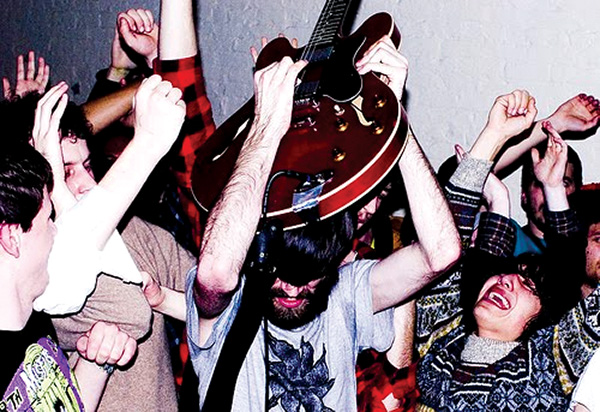
When the New Jersey outfit released their first record, The Airing of Grievances, it captured the hedonistic trudge of my junior year of college better than the soulless EDM and generic psychedelia that I’d been operating under. Within weeks, it graduated from bedroom blaster to the album that I insisted on playing at the peak of the party; the last call, whiskey brawl distilled into epic garage rock and journal-based desperation. Equal measures New Jersey punk and Bruce Springsteen, the music alone hit my sweet spot, but when you fold in Albert Camus quotations, suburban ennui, and general, all-encompassing excess, you’ve poured the perfect cocktail for a degenerate Philosophy major from Orange County.
I graduated, putzed about the nation, and found myself in Europe when The Monitor came out. Bigger, louder, and better produced, the Civil War-themed, all-American anthems provided perfect counterpoint to gaudy architecture and tourist hordes. Full of fuck-it-all fire and aimless, endless striving, I stalked stone streets and downed bottles of red wine in darkened parks, cheered on by howled verses, shouted choruses, and shredded guitars. In the quieter moments, when frontman Patrick Stickles winded down to existential confessionals, he wove a narrative line through school and out the other end; confused but furious, unsure, but ready to start a war. In Paris, I hit a rarified level of coincidental synchronization; while battling through unresponsive pedestrians and befuddled foreigners, the band chimed in: “The enemy is everywhere.” Pretty much.
A move to Somerville, Massachusetts, the home of many of Stickles’ screeds, cemented the album in my consciousness. The grandiose whirl of the piss drunk E Street Band, tempered by startling self-realizations, became an equal opportunity soundtrack for gin binges and late night writing sessions. On a cross country drive, after abandoning my unsuccessful post as a waiter, The Monitor revealed every broken town, every lonely stretch of road, and pumped me full of more go juice than the knockoff energy drink slotted in my cup holster. I’d enjoyed The Airing of Grievances, but this was something else, a far deeper association; Patrick Stickles and company performed the closest music that I had to direct psychic outpouring, give or take The Walkmen. I’ll spare you reprinting the entire lyric sheet of “The Battle of Hampton Roads,” as only a sample will suffice: “So when I leave Boston, my tail is between my legs / After deep cups of patience have been drunk to the dregs / And now I’m headed west on 84 again / And I’m as much of an asshole as I’ve ever been.” While the lyricist went a little further down the well of woe than I did, I knew the feeling behind every track, and more importantly, he knew me.
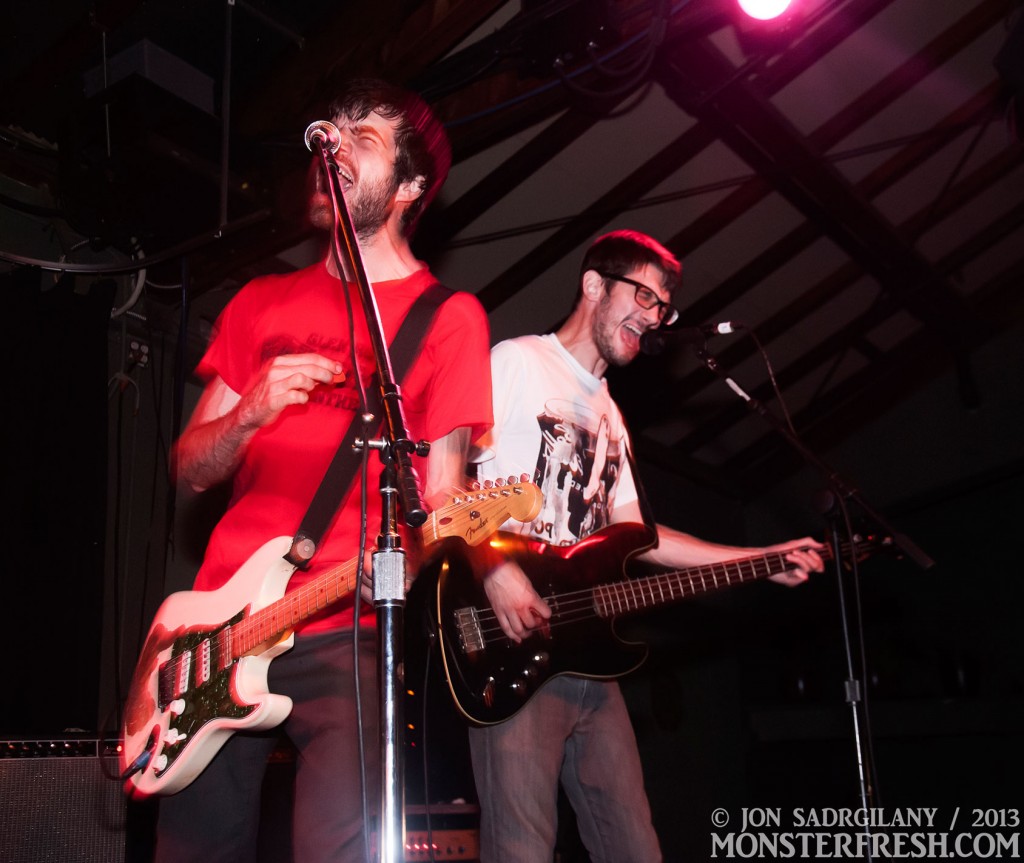
After Titus Andronicus toured behind The Monitor with the expansive personnel necessary to bring the bagpipes, strings, and dense guitars to life, they returned to a core formation to record their straightest rock and roll yet, Local Business. Lacking the coherent structure of previous releases, it played like the best Replacements record since Pleased to Meet Me, a mixed bag of just-left-of-radio rockers, unsettling ballads, and gag-filled near throwaways. Much like The Mats’ Let It Be opened with call to arms “I Will Dare,” Local Business kicked off with state of the union “Ecce Homo”; the raw aggression and chorus cadence of “We’re Coming Out” channeled in “Titus Andronicus Vs. the Absurd Universe (Third Round TKO)”; and the joint despair and longing of “Androgynous” and “Answering Machine” fused into album ending “Tried to Quit Smoking.”
Stickles has professed his admiration for The Replacements many times, even penning a 9,000-word deconstruction of their recent reunion show in Toronto. Rather than ape his idols’ music, however, recreating the same instrumentation they pioneered and rode to infamy, Patrick mimics their creative spirit, their approach, and displays more inspired abandon than the more faithful worshippers at the Church of Paul Westerberg. Especially live, Titus Andronicus engineer the same anything-can-happen spirit that built the foundation for The Replacements’ raucous reputation, save the professional meltdowns and alcohol poisoning scares.
The first time that I caught the stage show, I was at Coachella, two tabs-deep and blurred by blaring sun and booming bass. Titus offered a welcome respite from the skull-numbing rave tents, a proper set of analog rock broadcast to a flock of mid-afternoon devotees, though partly spoiled by throngs of latecomers and early goers. In the midst of The Monitor tour, the full band ripped and roared through the material with collective power, a resounding chorus of punk acolytes. Particulars are hazy, but I wasn’t sorry to miss Skrillex.
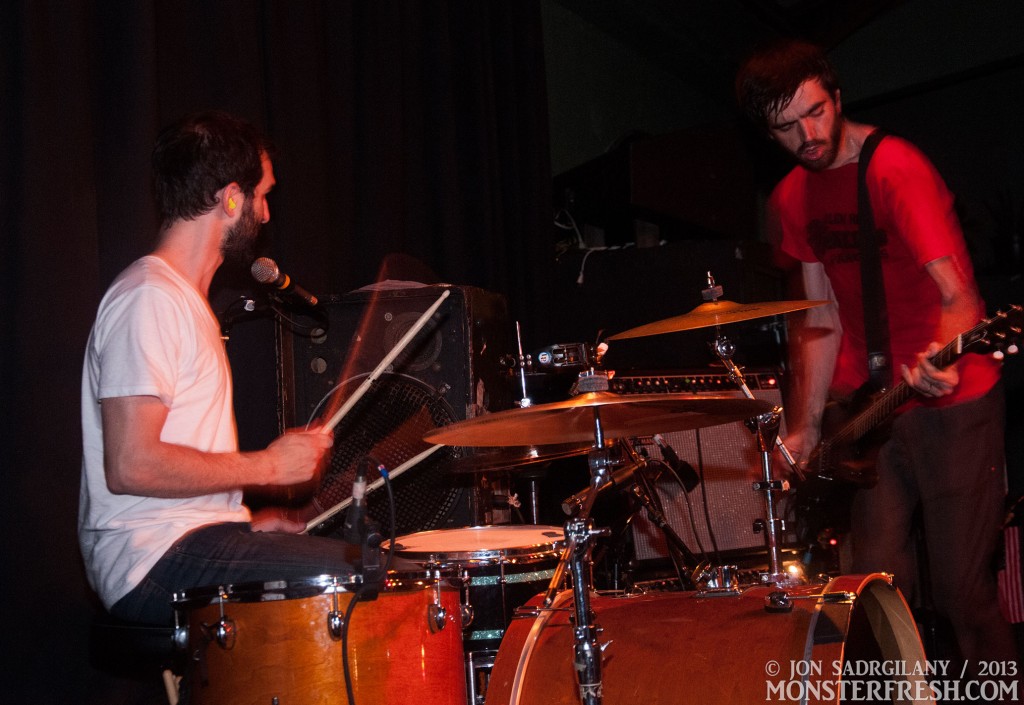
Earlier this month, in Santa Cruz, I saw them again at the college fortified venue, The Catalyst. With roped-off booze zones and strict hand stamp procedures, they drained excess from the picture, but that avenue had already closed due to the looming hour drive back. Far from full, the crowd clustered at the stage during opening acts and dispersed to the walls between, making it easy to pick Stickles out of the hooded masses. I wanted more witnesses in the room, more onlookers to heighten the reality, but it was a Monday night in a sleepy college town.
No matter the turnout, as soon as Titus Andronicus took the stage, they made the best of their surroundings. Beginning with oddball banter about our shared ocean love, Atlantic or Pacific, they quickly galloped into Local Business standout “In a Big City,” a defiant anthem full of the shout-along harmonies and easy chemistry that lends them a Weezer-with-balls vibe. Of course, Weezer never rocked this hard, nor did Rivers Cuomo near Stickles’s wasted vamp routine, slurring and leaning against the microphone stand like it’s the only thing keeping him alive. Instead of hanging out in the garage, playing D&D, Titus Andronicus spent their time learning to thrash.
Running through a healthy mix of all three albums, the consistency of their catalog–not in composition, but in tone–made it difficult to piece out individual tracks. For such a young group, they already have a firm grasp on a signature sound, chock-full of influence, but entirely individual–a unique soundscape unmistakeable for any other artist. The epitome of their particular brand of hook and noise is “A More Perfect Union,” the opening track and mission statement from The Monitor. After an introductory speech from Abraham Lincoln, Stickles spells out the terms of his alienation, while surging fuzz ramps up into a guitar lick where Springsteen would have stuck a saxophone. Weaving historical and personal narratives together, fusing patriotic rock and scuzzy punk, it is the perfect representation of their post-modern approach, their general disregard for previous context or traditional usage.
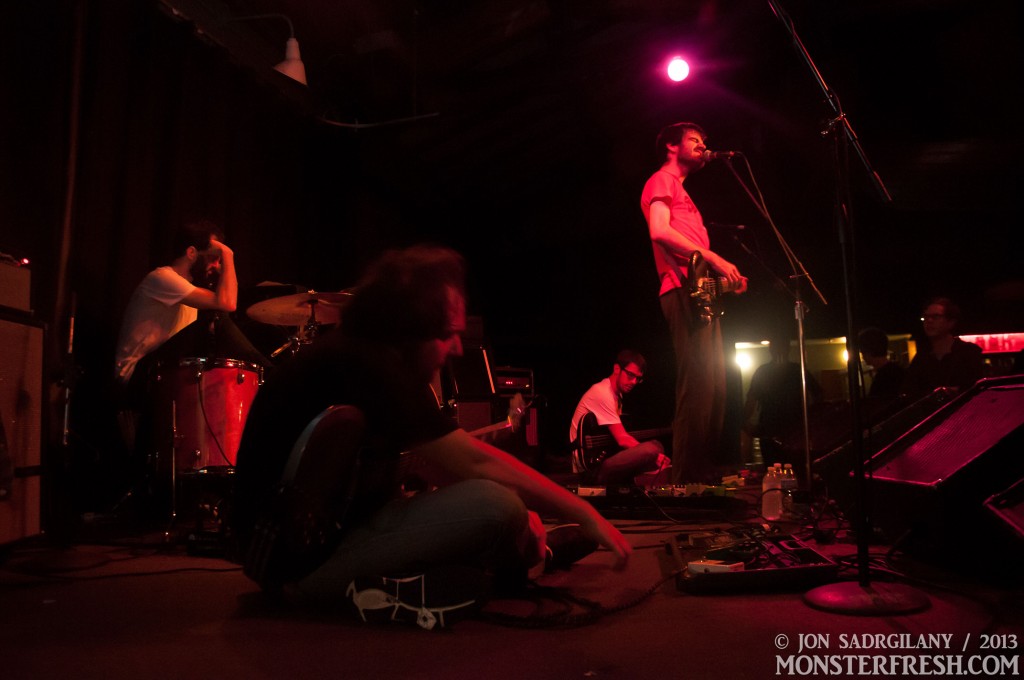
Like the material, Stickles’s stage banter is built on irreverence. From characterizing the crowd as a bunch of “21 year-olds with full mental facilities” to imagining himself as a hobo thirty years from now, spitting about time served in the Mars War, to complimenting us as the “best therapists, only [we’re] paying [him],” the 28 year-old frontman served up the right combination of backstory, bizarre jokes, and general absurdity. Between songs, as bandmates tuned, he caterwauled observational lyrics about the progression of the set and audience response, slipping into an opening chord when called upon. The best bit came in an extended analysis of Sophoclean tragedy to introduce the concept of a fatal flaw destroying a protagonist (or anyone, really) in part to explain its repetition over the next four minutes.
That song–titled “Fatal Flaw,” of course–is from their current project, a 30-plus-track rock opera inspired in part by Friedrich Nietzsche and manic depression. As told to the Missoulian, the plot concerns an alienated hero visited by a superhuman race, who tell him that he shares their power, with a catch: it’s as destructive as it is creative. As for the music, Stickles indicated higher speed and further distortion. Based on the three or four tracks previewed in Santa Cruz, Titus Andronicus is lined up to succeed where Green Day failed: writing a true punk rock opera.
Further proving their range, Patrick invited guitarist, Adam Reich; bassist, Julian Veronesi; and drummer, Eric Harm to sit out a few bars while he rolled out an extended solo intro. Appropriately, they retired to the bar for a refresher as the frontman churned “Four Score and Seven” for all the ringing despair it was worth, bleeding and building until group vocals and a storming crescendo necessitated the band’s return. While certainly the flag bearer, Stickles doesn’t operate with a James Brown type dictatorship, rather as the reluctant commander of a democratic collective. With opportunities to shred evenly distributed, backing vocals traded between all members, and dramatic silences pulled off by tight chemistry, Titus Androncius is a cohesive, proficient crew able to swing rockabilly strut, or full-bore hardcore, in a moment’s notice, often within the same song.
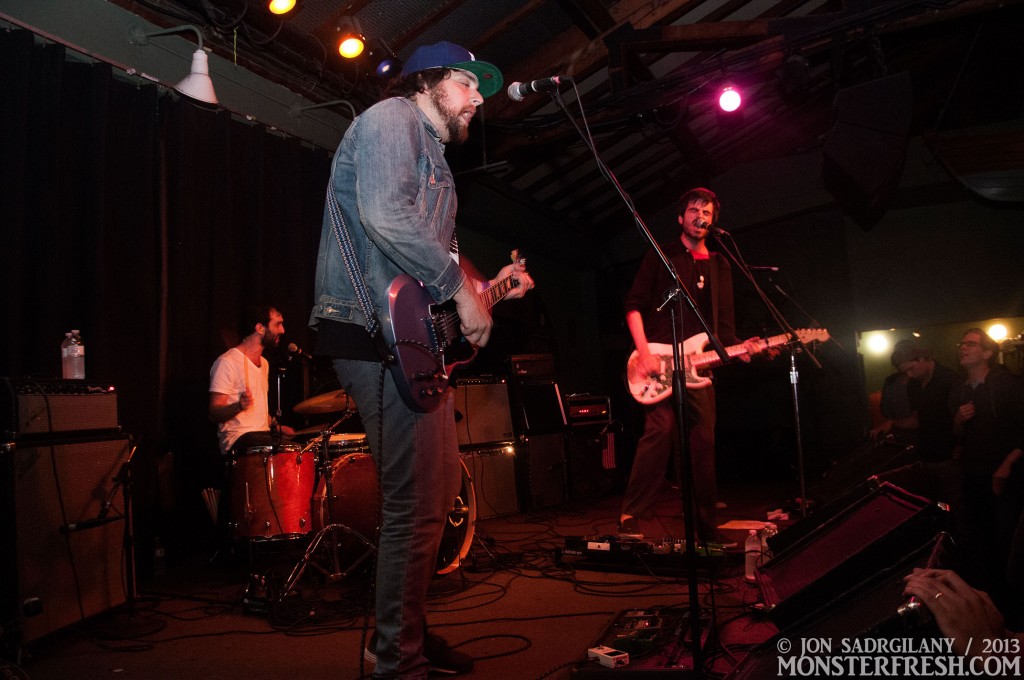
After expressing his gratitude for our fairly reserved response, insisting that he preferred a quiet and polite crowd to a noisy mosh pit, the 4-piece flew into “Fear and Loathing in Mahwah,” the first statement of intent from The Airing of Grievances. Depressing, uplifting, and, most of all, cathartic, when the band unplugged following some well-timed breakdowns, I was satisfied. Luckily, Stickles wanted one more and insisted that the “dream of the most fun Monday night ever isn’t over.” They launched into “My Best Friend’s Girl,” converting The Cars’ classic into a sinister groove anchored by the frontman’s rough Ric Ocasek. As we filed away, he urged us to drink plenty of water and eat our five fruits and vegetables a day.
There’s a lot to connect with in Titus Andronicus. They take bold, ambitious concepts and smear them in individual style, never content to ride out one road for too long. Dedicated to their fanbase and committed to high levels of performance, Stickles and company care because they were there, on our side of the stage, and know what it’s like to be absorbed in an artist’s words. Most of all, it’s their contagious enthusiasm, the sense that, even in the face of life’s meaningless and suffering, all we need is good tunes and better company.
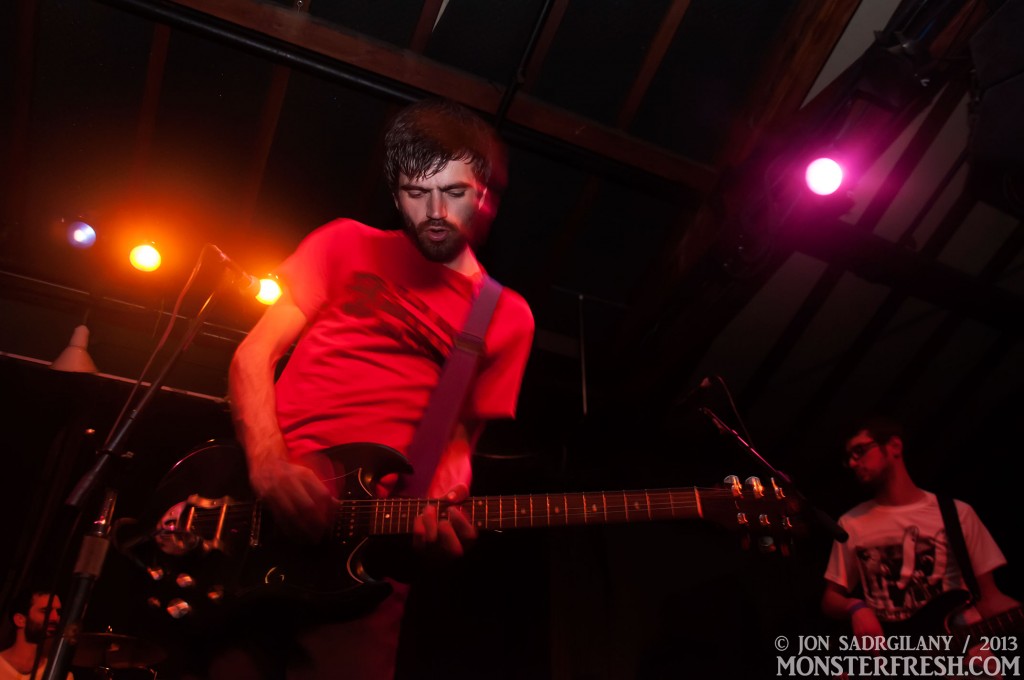
Excellent write up, sir. I am seeing them for the first time next month and could not be more excited.